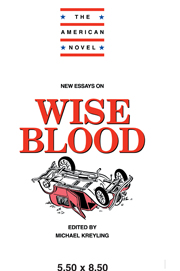Book contents
- Frontmatter
- Contents
- Series Editor's Preface
- NEW ESSAYS ON WISE BLOOD
- 1 Introduction
- 2 A Fondness for Supermarkets: Wise Blood and Consumer Culture
- 3 Framed in the Gaze: Haze, Wise Blood, and Lacanian Reading
- 4 “Jesus, Stab Me in the Heart!”: Wise Blood, Wounding, and Sacramental Aesthetics
- 5 The Woman without Any Bones: Anti-Angel Aggression in Wise Blood
- Notes on Contributors
- A Note on the Text
- Selected Bibliography
- Index
1 - Introduction
Published online by Cambridge University Press: 26 January 2010
- Frontmatter
- Contents
- Series Editor's Preface
- NEW ESSAYS ON WISE BLOOD
- 1 Introduction
- 2 A Fondness for Supermarkets: Wise Blood and Consumer Culture
- 3 Framed in the Gaze: Haze, Wise Blood, and Lacanian Reading
- 4 “Jesus, Stab Me in the Heart!”: Wise Blood, Wounding, and Sacramental Aesthetics
- 5 The Woman without Any Bones: Anti-Angel Aggression in Wise Blood
- Notes on Contributors
- A Note on the Text
- Selected Bibliography
- Index
Summary
About fifteen years ago, opening his review of The Habit of Being (1979 [henceforth HB]), a selection of Flannery O'Connor's letters, Robert Towers was startled “to recall that Flannery O'Connor would be only in her mid-fifties if she were alive today” (3). It is only a little less startling today, almost three decades after the writer's death in 1964, to realize that she would be “only” seventy this year, quite young enough to enjoy (if enjoyment is in fact a plausible description for what O'Connor might have felt) the veneration, awe, controversy, and simple hoopla that swirls around her life and work. I think she would have enjoyed it all. She wrote to one of her friends: “I seem to attract the lunatic fringe mainly” (HB 82).
You can, for example, buy a coffee mug with a cartoon of O'Connor baked into the glaze. She stares out at you with heavy-lidded seriousness, holding a Christian Bible and backed by the spread tail of a peacock – her trademarks. Text on the mug ticks off the major points of the O'Connor myth. She died young of a particularly sinister disease, systemic lupus erythematosus. She lived most of her thirty-nine years (1925–1964) in Milledgeville, Georgia, with her mother, Regina Cline O'Connor, on a farm called Andalusia. “Her stories [are] violent, bizarre, and teeming with metaphor and symbolism,” the mug continues. One of them, unnamed on the mug but well known to her many readers, has to do with “a reluctant atheist who puts his eyes out with lye [sic] and walks around with gravel in his shoes.”
- Type
- Chapter
- Information
- New Essays on Wise Blood , pp. 1 - 24Publisher: Cambridge University PressPrint publication year: 1995



